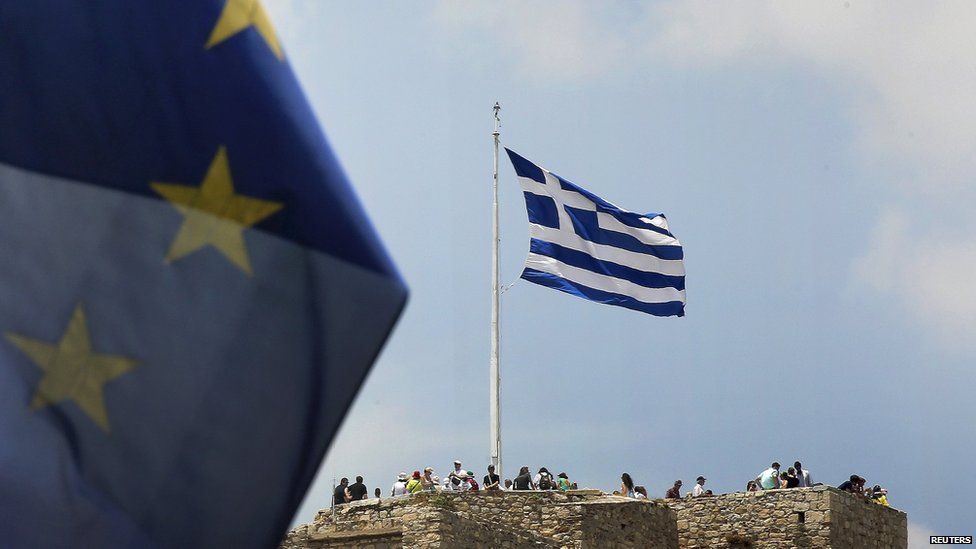Greece debt crisis: Athens rejects five-month bailout extension
- Published

Greece has rejected an offer from its creditors to extend the country's bailout deal as too little and likely to cause recession.
The country's international creditors made the new proposal so that it could avoid defaulting on its debt - providing it agreed to reforms.
The proposal would have released €15.5bn ($17.3bn) of funding, €1.8bn of which would have been available now.
A statement from the Greek government said it "cannot be accepted".
"The creditors' proposal to the Greek government would require introducing deeply recessionary reforms as a condition for the funding, which is totally inadequate, over the five months period," said the statement.
Greece and its creditors have been deadlocked despite the 30 June deadline for repayment of an IMF loan looming.
Greek PM Alexis Tsipras has called a meeting of the Greek government tonight to discuss the situation.
Earlier, he accused the lenders of blackmail, saying: "Europe's principles are not based on blackmail and ultimatums," he said. "In these crucial hours, nobody has the right to put these principles at risk."
German Chancellor Angela Merkel, however, had urged Athens to accept what she called an "extraordinarily generous" offer.
'No ultimatum'
The money is not new, but rather from existing bailout funds, and is still to be discussed by eurozone finance ministers, who are meeting on Saturday.
The president of the European Commission, Jean-Claude Juncker, said he was "optimistic, but not over-optimistic" about the chances of a deal.
"This is about the Greek people, not the government," he said. "Tomorrow's meeting will try to bring the positions together... There was no ultimatum. We are not running business by announcing ultimata."
The protracted negotiations have stalled over what reforms Athens is prepared to take, with disputes emerging on pensions and increasing Value Added Tax.
An official from one of the creditors told Associated Press that after the latest offer "the difference [between both sides] now is very, very small".
The Greek government has put forward budget proposals that it says meet the targets demanded by its creditors.
Mr Tsipras is returning to Athens to hold emergency talks with his government. Any deal must be passed by the Greek parliament.
If Greece does default, it could exit the eurozone, with possible repercussions for the rest of Europe and the world economy.
Only once agreement is reached will the European Commission, the European Central Bank (ECB) and the International Monetary Fund (IMF) unlock the final €7.2bn tranche of bailout funds for cash-strapped Greece.
Greek debt talks - main sticking points
Greece's debt dilemma explained in 75 seconds
- Greece has refused to accept cuts to pension payments or public sector wages
- The IMF is pushing for deeper spending cuts, not just more tax rises
- A key point of friction is a special benefit paid to some low-income pensioners, which creditors want scrapped
- Creditors also want a wider VAT base; Greece says it will not allow extra VAT on medicines or electricity bills, and has also resisted calls for VAT hikes on hotels and restaurants
- Athens wants a concrete commitment to debt relief, something its creditors are not offering